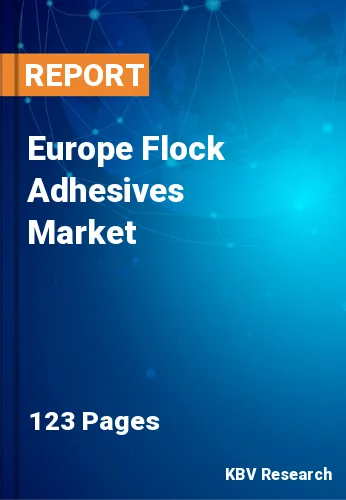Chapter 1. Market Scope & Methodology
1.1 Market Definition
1.2 Objectives
1.3 Market Scope
1.4 Segmentation
1.4.1 Europe Flock Adhesives Market, by Resin Type
1.4.2 Europe Flock Adhesives Market, by Application
1.4.3 Europe Flock Adhesives Market, by Country
1.5 Methodology for the research
Chapter 2. Market at a Glance
2.1 Key Highlights
Chapter 3. Market Overview
3.1 Introduction
3.1.1 Overview
3.1.1.1 Market Composition and Scenario
3.2 Key Factors Impacting the Market
3.2.1 Market Drivers
3.2.2 Market Restraints
3.2.3 Market Opportunities
3.2.4 Market Challenges
3.3 Porter’s Five Forces Analysis
Chapter 4. Europe Flock Adhesives Market, by Resin Type
4.1 Europe Acrylic Market, by Country
4.2 Europe Polyurethane Market, by Country
4.3 Europe Epoxy Resin Market, by Country
4.4 Europe Others Market, by Country
Chapter 5. Europe Flock Adhesives Market, by Application
5.1 Europe Textiles Market, by Country
5.2 Europe Automotive Market, by Country
5.3 Europe Paper & Packaging Market, by Country
5.4 Europe Others Market, by Country
Chapter 6. Europe Flock Adhesives Market, by Country
6.1 Germany Flock Adhesives Market
6.1.1 Germany Flock Adhesives Market, by Resin Type
6.1.2 Germany Flock Adhesives Market, by Application
6.2 UK Flock Adhesives Market
6.2.1 UK Flock Adhesives Market, by Resin Type
6.2.2 UK Flock Adhesives Market, by Application
6.3 France Flock Adhesives Market
6.3.1 France Flock Adhesives Market, by Resin Type
6.3.2 France Flock Adhesives Market, by Application
6.4 Russia Flock Adhesives Market
6.4.1 Russia Flock Adhesives Market, by Resin Type
6.4.2 Russia Flock Adhesives Market, by Application
6.5 Spain Flock Adhesives Market
6.5.1 Spain Flock Adhesives Market, by Resin Type
6.5.2 Spain Flock Adhesives Market, by Application
6.6 Italy Flock Adhesives Market
6.6.1 Italy Flock Adhesives Market, by Resin Type
6.6.2 Italy Flock Adhesives Market, by Application
6.7 Rest of Europe Flock Adhesives Market
6.7.1 Rest of Europe Flock Adhesives Market, by Resin Type
6.7.2 Rest of Europe Flock Adhesives Market, by Application
Chapter 7. Company Profiles
7.1 Sika AG (Sika Automotive AG)
7.1.1 Company Overview
7.1.2 Financial Analysis
7.1.3 Segmental and Regional Analysis
7.1.4 Research & Development Expenses
7.1.5 SWOT Analysis
7.2 H.B. Fuller Company
7.2.1 Company Overview
7.2.2 Financial Analysis
7.2.3 Segmental and Regional Analysis
7.2.4 Research & Development Expense
7.2.5 SWOT Analysis
7.3 The Dow Chemical Company
7.3.1 Company Overview
7.3.2 Financial Analysis
7.3.3 Segmental and Regional Analysis
7.3.4 Research & Development Expenses
7.3.5 Recent strategies and developments:
7.3.5.1 Partnerships, Collaborations, and Agreements:
7.3.6 SWOT Analysis
7.4 Avient Corporation
7.4.1 Company Overview
7.4.2 Financial Analysis
7.4.3 Segmental and Regional Analysis
7.4.4 Research & Development Expenses
7.4.5 SWOT Analysis
7.5 Parker Hannifin Corporation
7.5.1 Company Overview
7.5.2 Financial Analysis
7.5.3 Segmental and Regional Analysis
7.5.4 Research & Development Expenses
7.5.5 Recent strategies and developments:
7.5.5.1 Acquisition and Mergers:
7.5.6 SWOT Analysis
7.6 Stahl Holdings B.V.
7.6.1 Company Overview
7.6.2 Recent strategies and developments:
7.6.2.1 Business Expansions:
7.6.3 SWOT Analysis
7.7 Nyatex Adhesive and Chemical Company
7.7.1 Company Overview
7.7.2 SWOT Analysis
7.8 CHT Germany GmbH (RB Beitlich Industrie Beteiligungen GmbH)
7.8.1 Company Overview
7.8.2 SWOT Analysis
7.9 Kissel + Wolf GmbH
7.9.1 Company Overview
7.9.2 Recent strategies and developments:
7.9.2.1 Partnerships, Collaborations, and Agreements:
7.9.3 SWOT Analysis
7.10. SwissFlock AG (Dimontonate Floccati S.p.A.)
7.10.1 Company Overview
7.10.2 SWOT Analysis

